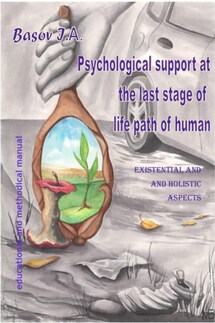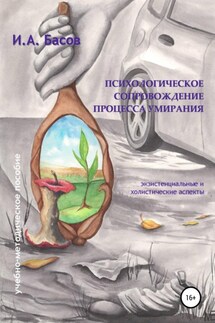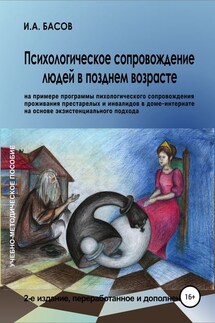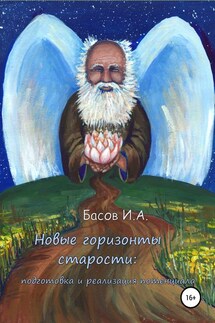Existential and psychological aspects of death
In the mass consciousness (and our culture is no exception), the topic of death is tabooed and presented as something unambiguously negative, and the process of dying, let's say, is treated without due respect. At the same time, death is an inevitable part of the life path, and has a huge semantic potential, many of the layers of which will be presented in this chapter.
As we noted earlier1, the attitude to death (unpacking its meanings) at a late age is one of the main existential tasks. Let's focus on it in more detail.
S.A. Belorusov considers the deep and hidden feeling of fear of death as what makes a person to be human, and overcoming it, meeting with it, as the way to a genuine, meaningful and fulfilling life. Meeting with this fear hidden in the depths of the soul always happens one-on-one; science, culture, ideology, "thoughtful" reasoning cannot save and help.
According to S.A. Belorusov, the world is fleeing from the meaning of life and death into "senseless mechanical acceleration with a complete blunting of the feeling of spiritual hunger"2, turning it into a problem, not a mystery, which it is. The outstanding philosopher M. Heidegger wrote about the mystical meaning of death: "Death causes anxiety because it touches the very essence of our being. But, thanks to this, there is a deep awareness of oneself. Death makes us individuals."3
S.A. Belorusov distinguish three types of death:
–biological (termination of physiological functions of the body);
–social (loss of place in society);
–spiritual (conscious rejection of oneself, the world and God).
The rupture of habitual ties (when our abilities, health, children, colleagues, friends are separated) in adulthood deeply hurts, but frees a person for inner growth, and the encounter with death (when beloved and dear people leave) pulls out of the abyss of everyday life, makes you think about life, its true secrets (for example, the antinomian truth spiritual sphere), to get closer to our true essence (that which is not subject to death is gaining strength).
V. Frankl wrote that a person should be open to everything that awaits him on the way, and without suffering and death, life is incomplete, flawed. S.A. Belorusov writes that conscious acceptance of the fact of one's own finiteness is a criterion of spiritual maturity, revealing four meanings of death:
1. it humbles a person, freeing him from pride and establishing a dialogue with the world and God;
2. ennobles life, not allowing you to drown (lose yourself) in the hustle and bustle, teaches you to accept all the gifts of being (which may be conditionally negative: failure, illness, loneliness, etc.);
3. death unites, makes it possible to realize the deep involvement in humanity and allows you to sum up, reveals the true, non-corruptible meanings of life. As V. Frankl wrote, who put the search for the wash of life by a person as the basis of psychotherapy: "In life a person is always in the process, in becoming. At every moment, one can only say about him that he "was", he is no longer the same as a moment ago. Only at the moment of death he "is". He is who he was in this life."4;
4. "The meaning of death is to overcome it. Death is overcome by love."5 S.A. Belorusov consider this meaning to be the main one, thus emphasizing that the transcendent meanings of life lead a person to true maturity, blessing, overcoming death itself.
The individual attitude to death, its understanding and the degree of acceptance largely determines the attitude to aging. Entering the last of the ages can be negative (fear, "hide-and-seek" with death, flight from old age, self-deception) and positive (resignation to the fact of fatigue from life, acceptance of completeness, letting go of life, refusal to burden it and oneself with duty, removal from the hustle and bustle of everyday life). In a negative scenario of aging, a person directs energy to the outside world, proving his need, trying to adapt to the fast rhythm of life, exhausting resources in the harassing pursuit of youth, coming to a sense of hopelessness, despair, helplessness. And on the contrary, in a positive scenario, a person realizes life itself as a transpersonal existential good that does not require a bygone social demand and activity. "The benefit of old age … is that old age helps a person, at least in the last years of his life, to get rid of his neediness… The existential possibilities of old age lie not in the plane of the "race for time", but in the special proximity of the elderly to eternity… They are needed precisely because they are not with us."6
In the study of the elderly and old age of G.Abramova, three interrelated, intertwined existential tasks can be distinguished. Along with summing up the results (the meaning of the years lived), which colors the days and days with feelings, there is the task of waiting for death, fearing which (consciously or unconsciously) a person sums up the moral outcome of his life, and "the ability to say goodbye to life without despair and horror, with a sense of completed work – this is another meeting of a person with his own existentiality; the meeting, which is a great mystery."














